Judi Lynn
Judi Lynn's JournalMoro Talks to Brazil's Federal Police about The Formation of the 'Hate Office'
Ex-minister says he heard colleagues comment on Carlos Bolsonaro's involvement
Nov.30.2020 1:40PM
Marcelo Rocha
BRASÍLIA
Former Justice Minister Sergio Moro told the Federal Police that he heard comments from palatial ministers about the connection of councilman Carlos Bolsonaro (Republicans-RJ), the son 02 of President Jair Bolsonaro, with the so-called "hate office."
The former judge also said he was the target of attacks by the group after leaving office.
Moro gave the testimony on the 12th, as part of the Supreme Court investigation into the anti-democratic acts.
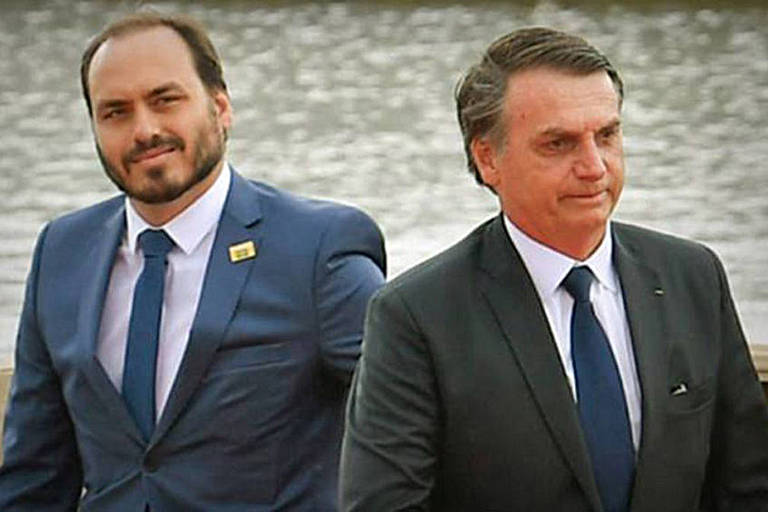
BRASILIA , DF , Carlos Bolsonaro and Jair Bolsonaro. Foto: Geraldo Magela | Agência Senado
The "hate office" is responsible for part of Bolsonaro's digital strategy. The ideological bunker is on the Planalto Palace's third floor, just a few steps from the Presidency office.v
More:
https://www1.folha.uol.com.br/internacional/en/brazil/2020/11/moro-talks-to-brazils-federal-police-about-the-formation-of-the-hate-office.shtml?utm_source=newsletter&utm_medium=email&utm_campaign=newsen
White supremacy in Colombia Part 1: Kill the Indians!
by Adriaan Alsema October 17, 2020
Racial discrimination in Colombia wasn’t a criminal offense until 2011 after a centuries-long history of white supremacy that persists until this day.
The concept of white supremacy was introduced by the Spanish after their arrival in the early 16th century, but 500 years later it is alive and well, especially when it comes to indigenous peoples of whom 67 were assassinated so far this year.
. . .
Many Colombians continue referring to indigenous with the same dehumanization and victim-blaming used at the beginning of their ethnic cleansing 500 years.
. . .
The first royal annihilation order
The Wayuu were the first people now called Colombians to meet a European, Alfonso de Ojeda, who convinced the Spanish crown to found a colony in La Guajira in 1500 or 1501.
Within three months, De Ojeda became the first of many Spanish to learn that the Wayuu were the only nation that could not be subdued.
The Kuna, on the contrary, welcomed De Ojeda and his fellow explorer Vasco Nuñez to the Uraba region just like they would later welcome French traders and Scottish pirates.
. . .
This welcoming attitude is believed to be the reason they were nearly annihilated and no longer live in Colombia.
Following De Ojeda’s stint with the Wayuu, Nuñez returned to Uraba in 1510 to build Santa Maria la Antigua and brought a 2000-men army to violently enslave the people, or kill them if they refused.
More:
https://colombiareports.com/white-supremacy-in-colombia-part-1-kill-the-indians/
The Emperor Has No Clothes
by Andres Kargar / November 27th, 2020
I reviewed Sra. Michelle Bachelet’s Report on Venezuela, and was quite outraged at her lack of consideration and due diligence. I will, in a moment, tell everyone why this report needs to be trashed, but even before that, I think I should mention two systemic flaws about this type of reporting regardless of which country it is written for.
First
The Report treats Venezuela as an isolated entity, along with other entities, such as the United States, Colombia,… floating in separate air space, without impacting or being impacted by any other country, in any way, shape, or form.
Everyone knows, however, that the truth is otherwise, that the funds the United States government has allocated to bring down the Maduro Bolivarian Government are probably more than some small countries’ annual budget, and that the United States’ sanctions to punish the Venezuelan people and deprive them of food, medicine, and fuel amount to no less than crimes against humanity. That clearly tells me that Venezuela is on earth and not in space, and both its government and its people are greatly impacted by the actions of other countries, and in particular the United States. It also, in my mind, invalidates the entire UN Report, but it takes spine, and we all know that Sra. Bachelet would not remain in office long if she attempted to produce one such report that takes into consideration all players influencing Venezuela and its people’s rights.
In this report, there is no mention of international criminals, such as Elliot Abrams (what a shame), who have been convicted in his own country and is now running loose, being employed by the Trump Administration to bring death and horror upon the people of Venezuela, as they did in El Salvador, Nicaragua, Guatemala,… CAN A TRUE HUMAN RIGHTS OBSERVER REALLY REMAIN SILENT ON THESE ISSUES?
Second
The expression “Political Prisoner” is loosely defined and even more loosely utilized. A political prisoner is someone who has been imprisoned or subjected to other restrictions by the State, because of his beliefs, party affiliations, or peaceful protest. Such description is generally accepted by most, but loosely used to include violent opposition as well. As Fidel Castro would often ask: “Don’t we have the right to defend ourselves?” This issue is seldom addressed by ‘human rights’ organizations. Many people who are presented as political prisoners are often violent individuals of no independent character who are funded by the United States government or private individuals, somehow tied to the US government. Unless the HR report presents a list of the individuals, their alleged crimes against the State, and their investigated claims, one can never be certain if they can be categorized as political prisoners.
In addition, repressive actions by ‘friendly governments’ are oftentimes ignored whereas ‘unfriendly governments’ are placed under constant scrutiny. As an example, how can we put Venezuela under a magnifying glass when daily crimes by the repressive State in Saudi Arabia are often ignored? In my opinion, those who place the Bolivarian State right next to the Saudi Arabian Dictatorship must be mentally deranged.
The report is all unproven innuendos and play-with-words. It keeps referencing itself so many times that one starts wondering where the meat is. What is the real content? Where are the emperor’s clothes?
More:
https://dissidentvoice.org/2020/11/the-emperor-has-no-clothes/
The victims of forced sterilizations in Peru continue to demand justice
Currently, 1,321 indigenous women are seeking justice by legal means
Translation posted 13 November 2020 17:37 GMT
In Peru, during the government of Alberto Fujimori, 244,234 women and 20,693 men were irreversibly sterilized as part of national family planning policies (1996-1999). These forced surgical procedures were denounced as violations of human rights, especially of indigenous populations in rural areas. Currently, 1,321 women continue to pursue the legal process of seeking justice against a policy that infringed their rights over two decades ago.
On September 17, the activist groups of victims gathered to embroider their names on the Peruvian flag, to highlight their case. Dressed in the red and white colours of the national flag, they held a demonstration on the beach in Lima—socially distanced as a measure to prevent the spread of COVID-19—as they continued to denounce the ways in which the Peruvian justice system turned its back on them. Andean women travelled over a thousand kilometers from the mountains to seek justice in the capital. Despite their frustration, they have not given up, but they continue to fight to achieve justice for themselves and for the thousands of other women who have been abused.
The case was opened 18 years ago and a court ruling is still pending in Peru's national justice system. Faced with this situation, five of the victims have appealed to international justice. Their complaint against the Peruvian State was filed before the United Nations Committee on the Elimination of All Forms of Discrimination Against Women (CEDAW) at the end of September 2020. Peru is being sued at the international level for these state practices that violated the bodies of indigenous women. The complaint calls for reparations for those who were harmed by these policies.
The failure to attain justice in their country re-victimizes women and maintains impunity for human rights violations. This case of forced sterilizations is a clear example that questions the progress of democracy and transitional justice — an adequate redress for victims of mass atrocities during conflicts. It is unacceptable that these violent systemic acts are followed by justice processes that disrespect international agreements to which Peru is a signatory. For this reason, in a country like Peru, where respect for human rights is not guaranteed, where torture by the State and femicide are urgent problems, and where citizens’ protest is criminalized, the victims have few ways to claim justice nationally.
More:
https://globalvoices.org/2020/11/13/the-victims-of-forced-sterilizations-in-peru-continue-to-demand-justice/
Report: Inmates killed in Colombia riot shot intentionally
Source: Associated Press
New evidence indicates most of the 24 inmates killed during a prison riot in Colombia’s capital earlier this year over fears that crowded, unhygienic conditions would fuel a virus outbreak were shot to death intentionally
By The Associated Press
November 24, 2020, 12:53 AM
• 3 min read
BOGOTA, Colombia -- New evidence indicates most of the 24 inmates killed during a prison riot in Colombia’s capital earlier this year over fears that crowded, unhygienic conditions would fuel a virus outbreak were shot to death intentionally, according to a report released Tuesday by Human Rights Watch.
The organization said autopsy reports it commissioned from independent forensic experts shed light on one of the deadliest prison uprisings in the nation’s recent history.
The Independent Forensic Expert Group and the International Rehabilitation Council for Torture Victims concluded that none of the dead were shot in a way that indicates whover fired only wanted to injure them.
“Most of the gunshot wounds described in the autopsy reports are consistent with having been produced with the objective of killing,” the experts found.
Read more: https://abcnews.go.com/International/wireStory/report-inmates-killed-colombia-riot-shot-intentionally-74371920
Colombia shocked by two massacres on one day as Duque goes mute
by Adriaan Alsema November 23, 2020
Colombia’s far-right President Ivan Duque went mute on Sunday after two massacres made it painfully clear how his government is sinking the country into violent chaos.
A massacre in Betania, a small town in the southwest of the Antioquia province, became the 76th this year and left seven people dead and three people injured.
. . .
Duque’s “Peace with Legality”
The peace process is fiercely opposed by the president’s political patron, former President Alvaro Uribe, a former Medellin Cartel associate who is being investigated for his alleged complicity in three massacres.
Instead of implementing the peace process, Duque created a so-called “Peace with Legality” process, which appears to be sinking historically violent regions like Antioquia and Cauca into violent chaos.
More:
https://colombiareports.com/colombia-shocked-by-two-massacres-on-one-day-as-duque-goes-mute/
Brazil's Largest City May Soon Have a Socialist Mayor
BY HUGO ALBUQUERQUE
Brazil is still dominated by Jair Bolsonaro’s unhinged reactionary politics. Which makes it all the more incredible that the leftist housing organizer Guilherme Boulos recently defied all expectations by making it to a runoff in São Paulo’s upcoming mayoral election.
On November 15, housing rights activist and rising star of the Brazilian left Guilherme Boulos made it into the runoff elections for the mayorship of São Paulo — the largest city in all the Americas and the financial center of Brazil. A member of the Socialism and Freedom Party (PSOL), Boulos ran alongside vice mayoral candidate Luiza Erundina, a veteran socialist who in the 1980s served as the first woman mayor of São Paulo.
With scant resources and electoral rules stacked against his party, Boulos defeated the Bolsonaro-backed far-right candidate Celso Russomanno to the second-place spot. That upset also means that the runoff election will take a sharp leftward turn, leaving out the influential Jilmar Tatto from the more social-democratic Workers’ Party (PT).
The conclusions to be drawn from Boulos’s victory are several. For one, it proved that a radical left-wing platform could overtake far-right forces both on social media and in the streets. Just as importantly, Boulos’s success suggests that the old pro-Lula / anti-Lula dichotomy that has so divided the Brazilian left in recent years may finally be drawing to a close.
Regardless of whether Boulos can clinch the November 29 runoff elections, when he will square off with the center-right Brazilian Social Democracy Party (PSDB) candidate Bruno Covas, his campaign has been an unqualified success. It has shifted the tectonic plates of Brazilian politics and put forward a strategic, technological, and ideological alternative that could very well pave the way forward for the Brazilian left.
More:
https://www.jacobinmag.com/2020/11/brazil-runoff-elections-guilherme-boulos-psol-pt-lula
Very helpful background in article.
Paraguay: Corruption And Violation Of Human Rights - OpEd
November 21, 2020
By Peter Tase
. . .
On another front, Paraguayan Supreme Court leadership have not provided legal support nor respected human rights when it comes to improving the wellbeing of indigenous communities in Paraguay, including the Guaraní, Ayoreo, Toba-Maskoy, Aché and Sanapaná communities in Caaguazú, San Pedro and other provinces. Lack of documentation among indigenous teenagers and adults, should in no case be a barrier to the highest quality of healthcare. Indigenous people are less likely to carry an ID document in Paraguay, and they are totally subjugated from the government officials in the country, as the latter have a vested interest to turn indigenous communities’ ecosystem and forests into arable land and transgenic soy plantations. Consequentially, Indigenous population is decimated in the country, has become ever more vulnerable and is not able to access various social programs and receive healthcare treatment.
With the ongoing public health pandemic; all COVID-19 care should be provided free of charge to those who cannot afford to pay; and indigenous communities in Concepcion, San Pedro and Amambay, are extremely vulnerable and have not access to public health services nor basic hygiene resources.
In Paraguay, indigenous women can access maternal health care less than other women and some of these women have expressed concern about the fact that cost is a factor in securing a good medical treatment. Another pending matter is the lack of information resources made available to indigenous communities in their own language (to prevent disease and fatigue) ; for example in rural Paraguay there are no health care materials available in Guarani language nor in Ache or Ayoreo indigenous languages.
The Government of Mario Abdo Benítez has not pursued policies that improve nutrition and access to food among indigenous communities and their kids, while it is publicly known that the Ayoreo and other communities are living in extreme poverty situations and their kids have become vulnerable to child labor, sexual abuse and other psychological disorders. The National Strategy for the Prevention and Eradication of Child Labor and Protection of Teenage Workers is simply a grossly ignored policy that is not being implemented.
Paraguay continues to be a failed state, its leaders have become a laughing stock in the world stage while its rural indigenous communities, although deeply succumbed into poverty, are the nation’s only source of dignity, ethics and moral when it comes to respect for the rule of law and their willingness to consolidate democratic governance; meanwhile Paraguay’s Supreme Court is ruled by some of the worst and corrupt judges of Latin America and the country’s Former Vice President has died in captivity since late September 2020, meanwhile local media refuses to acknowledge this fact. Asuncion needs a new breed of leaders that are encouraged by patriotism, hard work, by a great sense of integrity and ethics.
More:
https://www.eurasiareview.com/21112020-paraguay-corruption-and-violation-of-human-rights-oped/
~ ~ ~
Paraguay was ruled for 35 years by a fascist dictator, Alfredo Stroessner, with the blessings of the U.S., particularly the right-wing.
Wikipedia:
Alfredo Stroessner Matiauda (Spanish: [alˈfɾeðo estɾozˈneɾ]; November 3, 1912 – August 16, 2006) was a Paraguayan Army officer who was dictator of Paraguay from 1954 to 1989. He ascended to the position after leading an army coup in 1954. His 35-year-long rule, marked by an uninterrupted period of repression in his country, is the longest in modern South American history.
. . .
Soon after taking office, Stroessner declared a state of siege, which allowed him to suspend civil liberties. The state-of-siege provisions allowed the government to arrest and detain anyone indefinitely without trial, as well as forbid public meetings and demonstrations. It was renewed every 90 days until 1987, except for a brief period in 1959. Although it technically only applied to Asunción after 1970, the courts ruled that anyone charged with security offenses could be brought to the capital and charged under the state-of-siege provisions—even if the offense took place outside the capital.[2][3] Apart from one 24-hour period on election days, Stroessner ruled under what amounted to martial law for nearly all of his tenure. A devoted anti-communist who brought Paraguay into the World Anti-Communist League, he justified his repression as a necessary measure to protect the country.
Paraguay enjoyed close military and economic ties with the United States and supported the US invasion of the Dominican Republic.[4] The Stroessner regime even offered to send troops to Vietnam alongside the Americans.[5] The United States played a "critical supporting role" in the domestic affairs of Stoessner's Paraguay.[6] Between 1962 and 1975 the US provided $146 million to Paraguay's military government and Paraguayan officers were trained at the US Army School of the Americas.[7] Although the military and security forces under Stroessner received less material support from the United States than other South American countries, strong inter-military connections existed through military advisors and military training. Between 1962 and 1966, nearly 400 Paraguayan military personnel were trained by the United States in the Panama Canal Zone and on US soil.[8] Strong Paraguayan-U.S. relations continued until the Carter Administration emphasized a foreign policy that recognized human rights abuses, although both military and economic aid were allotted to the Paraguayan government in Carter's budgets.[9] The Reagan Administration restored more cordial relations due to Stroessner's staunch anti-communism, but by the mid 1980s relations cooled, largely because of the international outcry over the regime's excesses, along with its involvement in narcotics trafficking and money-laundering.[10][11][12] In 1986, The Reagan administration added his regime to its list of Latin American dictatorships.[13]
. . .
Operation Condor
Paraguay was a leading participant in Operation Condor, a campaign of state terror and security operations officially implemented in 1975 which were jointly conducted by the military dictatorships of six South American countries (Chile, Argentina, Bolivia, Paraguay, Uruguay and Brazil) with the support of the United States.[21][22][23][24] Human rights violations characteristic of those in other South American countries such as kidnappings, torture, forced disappearances and extrajudicial killings were routine and systematic during the Stroessner regime. Following executions, many of the bodies of those killed by the regime were dumped in the Chaco or the Río Paraguay. The discovery of the "Archives of Terror" in 1992 in the Lambaré suburb of Asunción confirmed allegations of widespread human rights violations.[25]
Pastor Coronel was the chief of the Department of Investigations, or secret police. He would interview people in a pileta, a bath of human vomit and excrement, or ram electric cattle prods up their rectums.[26][27][11] In 1975, the Secretary of the Paraguayan Communist Party, Miguel Ángel Soler [es], was dismembered alive with a chainsaw while Stroessner listened on the phone.[26][28][29][30] The screams of tortured dissidents would often be recorded and played over the phone to family members, and sometimes the bloody garments of those killed were sent to their homes.[14]
Under Stroessner, egregious human rights violations were committed against the Aché Indian population of Paraguay's eastern districts, largely as the result of U.S. and European corporations wanting access to the country's forests, mines and grazing lands.[31][7] The Aché Indians resided on land that was coveted and had resisted relocation attempts by the Paraguayan army. The government retaliated with massacres and forced many Aché into slavery. In 1974 the UN accused Paraguay of slavery and genocide. Only a few hundred Aché remained alive by the late 1970s.[7] The Stroessner regime financed this genocide with U.S. aid.[7]
More:
https://en.wikipedia.org/wiki/Alfredo_Stroessner
~ ~ ~
In Paraguay, a Quaint Inn with a Dark Nazi Past
By Paolo Manzo / La Stampa Thursday, Nov. 03, 2011
SAN BERNARDINO — Experiencing the Nazi legacy in South America costs just $40. This is the rate to spend a night in the best room of the Hotel del Lago, founded in 1888 on the shores of the Ypacaraí Lake, in Paraguay, in the small town of San Bernardino, 50 kilometers east of the country's capital, Asuncion.
(Read a brief history of Nazi fugitives.)
Given that Paraguay does not have access to the sea, the lake is the trendiest destination for a vacation. San Bernardino, however, is notorious as the place that sheltered Joseph Mengele, the Angel of the Death, a German SS officer and physician in the Nazi concentration camp Auschwitz-Birkenau.
After Germany's defeat in World War II, Mengele fled to South America where he hid for decades.
According to unproven theories, Mengele, one of the most wanted Nazi war criminals, died in San Bernardino, not in Brazil, as usually reported. Regardless, there are plenty of other phantoms from the past in this small town, which was founded in 1881 by five German families, and still hosts a German Mennonite colony.
The hotel is still very popular and has a cultural center that promotes local craftsmanship. But behind its quiet façade and tropical setting, this village hides a long string of connections with Nazism.
. . .
http://content.time.com/time/world/article/0,8599,2098534,00.html
~ ~ ~
WHERE NAZI REFUGEES FOUND THE CLIMATE TO THEIR LIKING
By Alan Riding
June 16, 1985
IF forensic experts prove that a body exhumed here 10 days ago is that of the Auschwitz death camp doctor Josef Mengele, as his son, Rolf, affirmed last week, the most-wanted Nazi would have lived in South America for 30 years without being caught. If the bones are not his, Dr. Mengele could still be at large.
In either case, he was not alone. Tens of thousands of Nazis escaped to Argentina, Paraguay, Chile, Bolivia and Brazil after World War II. In 40 years, one war criminal was murdered, another was kidnapped and just three were extradited to face trial in Europe. Dr. Mengele was widely hunted, but Brazilian police believe he lived undisturbed in the Sao Paulo area from 1961. Other fugitives, many in their 70's and 80's, have little reason for fear.
The Nazi flight to South America was no accident. Large, long-established German colonies quickly absorbed the new wave of immigrants. Some Nazis changed their names, yet surprisingly few felt a need to do so. Many fared well on farms, in industry - not infrequently in West German multinational companies - and even occasionally as police and military advisers.
The political mood was not hostile. Responding to domestic fascist movements, several governments leaned toward Germany and Italy until their defeat became certain. Even after the war, pro-Nazi sympathies survived. Argentina's President Juan D. Peron welcomed fleeing Nazis. When General Peron was ousted in 1955, Gen. Alfredo Stroessner, the grandson of Bavarian immigrants, opened Paraguay to the fugitives.
During his early years in the region, even Dr. Mengele felt safe. He arrived in Buenos Aires in 1949 and made little attempt to hide his identity. He was married under his own name in Uruguay in 1958 and, as ''Jose Mengele'' in 1959, became a citizen of Paraguay, where he lived briefly in a German colony and was befriended by local Nazi sympathizers.
More:
https://www.nytimes.com/1985/06/16/weekinreview/where-nazi-refugees-found-the-climate-to-their-liking.html
Panama court orders new trial for ex-President Martinelli in spying case
By Metro US
Posted on November 20, 2020
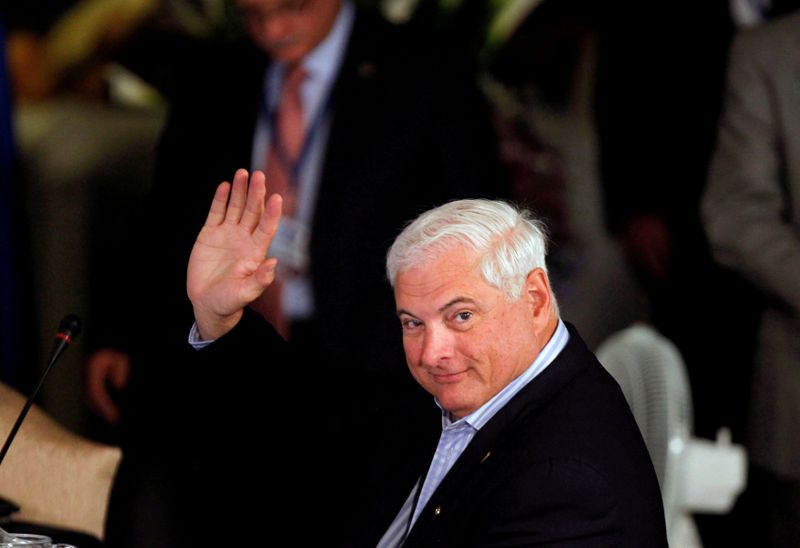
FILE PHOTO: Panamanian President Ricardo Martinelli waves during an anti-drugs summit at the Santo Domingo Hotel in Antigua
PANAMA CITY (Reuters) – A Panamanian court has ordered a new trial of former President Ricardo Martinelli in a case alleging he unlawfully spied on politicians, union leaders and journalists during his 2009-2014 presidency, the country’s top prosecutor announced on Friday.
The appeals court threw out Martinelli’s 2019 not guilty verdict, but did not set a date for the new trial.
Prosecutor Ricaurte Gonzalez cited what he described as “an incorrect assessment of much of the evidence” presented at the previous trial.
A supermarket tycoon who sought a political comeback in 2019, the ex-president was accused of ordering the interception of telecommunications without judicial authorization for some 150 individuals.
Martinelli maintained his innocence and accused his successor and one-time ally Juan Carlos Varela of conspiring against him.
https://www.metro.us/panama-court-orders-new/
(Short article, no more at link.)
You may recall when he feared the law was coming after him, he ran to Italy and hid out for a time with his dear friend, Silvio Berlusconi, who else?
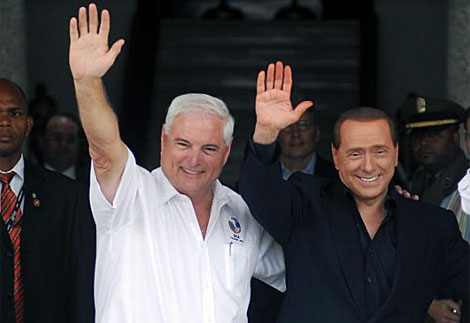
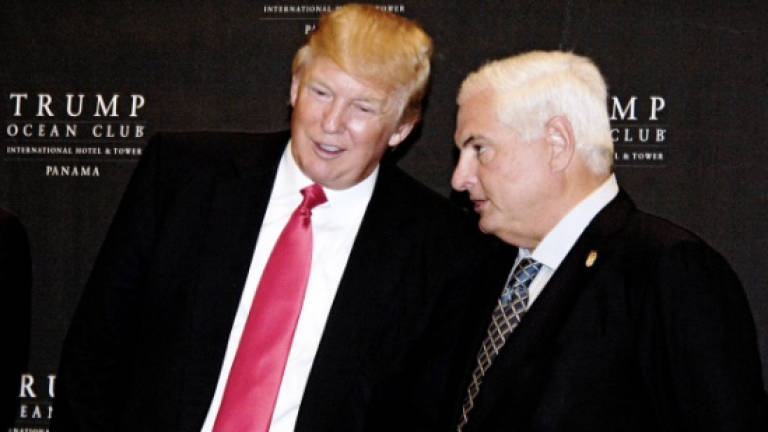
Martinelli, with Trump, who owned a hotel in Panama

Berlusconi, lucky host to fellow grifter Martinelli and son


Martinelli, sharing a mild "stink eye."

Moment of self-mockery, gesturing he will win.

G'bye!
~ ~ ~
A tender Panama-Trump story from a few years ago:

CROWNING MOMENT: Donald Trump crowned
Justine Pasek of Panama Miss Universe in
September, 2002. Pasek later acted as a
spokesperson for the Homes Real Estate
Investment & Services company in Panama.
REUTERS/Chip East
Ivanka and the fugitive from Panama
Exclusive: How an alleged fraudster in Panama, working with Donald Trump's daughter, helped make Trump's first international hotel venture a success. The broker was in business with a money-launderer and two criminals from the former Soviet Union. Then he fled.
By NED PARKER, STEPHEN GREY, STEFANIE ESCHENBACHER, ROMAN ANIN, BRAD BROOKS and CHRISTINE MURRAY Filed Nov. 17, 2017, noon GMT

PANAMA CITY/TORONTO - In the spring of 2007, a succession of foreigners, many from Russia, arrived at Panama City airport to be greeted by a chauffeur who whisked them off in a white Cadillac with a Donald Trump logo on the side.
The limousine belonged to a business run by a Brazilian former car salesman named Alexandre Ventura Nogueira, who was offering the visitors a chance to invest in Trump’s latest project – a 70-floor tower called the Trump Ocean Club International Hotel and Tower. It was the future U.S. president’s first international hotel venture, a complex including residential apartments and a casino in a waterfront building shaped like a sail.
“Mr Nogueira was an outgoing and lively young man,” remembered Justine Pasek, who was crowned Miss Universe by Donald Trump in 2002 and was acting in 2007 as a spokesperson for Nogueira’s company, Homes Real Estate Investment & Services. “Everybody was so impressed with Homes as they seemed to be riding the top of the real estate boom at the time,” she said.
One of those Nogueira set out to impress was Ivanka, Trump’s daughter. In an interview with Reuters, Nogueira said he met and spoke with Ivanka “many times” when she was handling the Trump Organization’s involvement in the Panama development. “She would remember me,” he said.
More:
https://www.reuters.com/investigates/special-report/usa-trump-panama/
Racist murder in Brazil: Little has changed in the 325 years since Zumbi's killing
In 2020, Black Awareness Day is marked by the brutal death of João Alberto Silveira Freitas, beaten by two security guards in a Carrefour store in Porto Alegre.
Manuella Libardi
20 November 2020
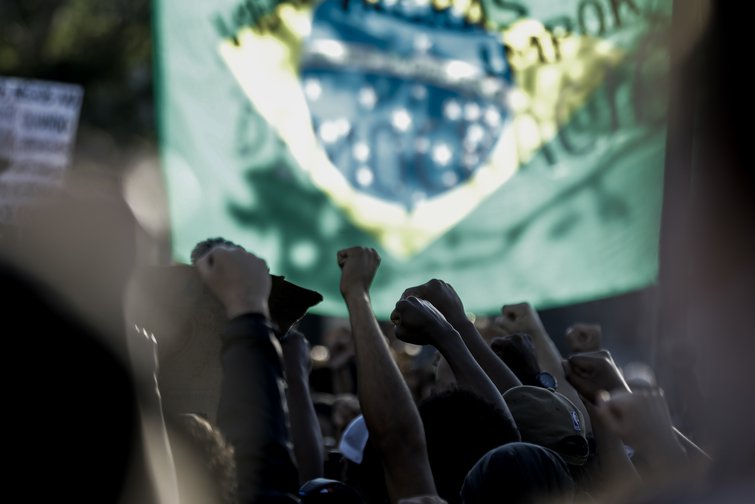
Demonstrators in defense of black lives, against racism, fascism and against the government of President Jair
Bolsonaro in São Paulo, June 7, 2020 | Marcelo Chello/Zuma Press/PA Images
In 1695, Zumbi – a warrior and leader of former Black slaves – was captured in his last hiding place between the mountains of Barriga and Dois Irmãos, in Northeastern Brazil. For a year and a half, he survived in the bush, fleeing the Bandeirantes – led by Domingo Jorge Velho – who destroyed Quilombo dos Palmares, the largest of colonial Brazil.
On November 20, Zumbi dos Palmares, 40, was decapitated by captain André Mendonça de Furtado and his displayed on a spike. Zumbi was tortured and killed for liberating himself from enslavement and protecting those who had done the same.
As a result of his violence and persecution, Domingo Jorge Velho received “a vast amount of land” to intensify the settlement of the region with the help of his associates. His "services" earned him the rank of "Master of the Field".
. . .
In 2020, late on Thursday, on the eve of the holiday that celebrates the worth and contribution of Black people to the country, João Alberto Silveira Freitas was beaten to death by two security guards in a Carrefour store in Porto Alegre, capital of Rio Grande do Sul state, an event recorded by several cellphones and shared on social media. Like Zumbi, João Alberto Silveira Freitas was a 40-year-old Black man.
More:
https://www.opendemocracy.net/en/democraciaabierta/racist-murder-brazil-black-awareness-day-zumbi/
~ ~ ~
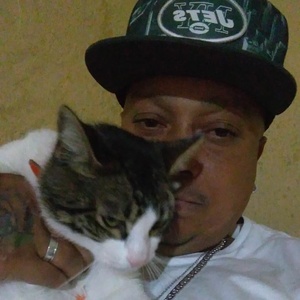
Before brutal murder, oão Alberto Silveira Freitas.

O Globo Newspaper
633K subscribers
João Alberto Silveira Freitas, 40, was brutally beaten to death by two security guards at the exit of a Carrefour supermarket in Porto Alegre, Rio Grande do Sul. Videos circulating on social networks show him being grabbed by the back by one security guard and attacked by another with several punches to the head. Beto, as the victim was known, died on the spot before the help arrived. Carrefour spoke about João Alberto's death at dawn on Friday. He informed that the employees, hired by an outsourced company, were dismissed and 'upon learning of this inexplicable episode, we started a rigorous internal investigation'. The case draws even more attention because it happened on the eve of Black Awareness Day, and the video causes revolt on social networks.
Profile Information
Member since: 2002Number of posts: 160,656